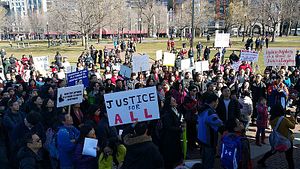On November 20, 2014, a rookie New York City policy officer named Peter Liang was on a routine patrol in Brooklyn’s Pink Houses, arguably the most dangerous housing projects in New York, when he entered a pitch-black stairwell, his flashlight in one hand and Glock 19 service pistol in the other. Suddenly, someone burst in. A startled Liang unintentionally discharged his gun, the bullet bounced off a wall, and Akai Gurley, a 28-year-old African-American, died. A grand jury convicted Liang of manslaughter earlier this month, making him the first NYPD officer in over a decade to be convicted in a fatal shooting, and causing outrage among many Asian-Americans.
Not since the Los Angeles riots, 24 years ago, has an act of police violence so sharply divided the Asian-American and African-American communities. Then, in 1992, many African-Americans rioted in protest of the Rodney King verdict, and almost half of the damage done was to Korean-owned stores. Afterwards, some 30,000 Korean-Americans marched through Koreatown, over blocks of broken glass and the burned remains of gutted shops. It was the largest Asian-American rally in U.S. history.
Liang’s conviction has similarly led to much race-based reasoning on both sides, with tens of thousands of Asian-Americans nationwide rallying for Liang, and African-American advocacy groups like the Black Lives Matter movement supporting his conviction. Meanwhile, China has given the matter ample media attention and permitted protesters to organize via WeChat, two things it would never do if these protests were based in China.
Moreover, Chinese media are calling the case evidence of “chronic racial discrimination,” and holding it up as evidence of American society’s racial bias. Shen Dingli, Fudan University’s associate dean of international studies, described Liang’s actions as “not impeccable,” but also called him a “scapegoat.”
Similarly, in the United States, New York City Councilwoman Margaret Chin has blamed Liang’s training, former New York City Comptroller John Liu has called the decision “a great injustice,” and San Francisco-based law professor Frank Wu has said, “Peter Liang has been made a scapegoat. The dictionary definition of the Biblical term is an individual (originally a goat) sacrificed for the sins of others. He is a fall guy.”
But Liang’s indictment is no injustice, and Liang is no scapegoat. Scapegoats are innocent and Liang did, after all, kill Gurley, albeit unintentionally. Of course, not everyone in the Asian-American community has thrown in with the pro-Liang crowd. In an article for Huffington Post, Steph Yin wrote of his disappointment concerning the recent rallies, arguing that while white officers should be brought to book more often, this doesn’t mean that Liang should be let off the hook because he’s Asian.
And writing for The New York Times Magazine, Jay Caspian Kang commented that “no amount of nuance or qualification … will change the fact that the first massive, nationwide Asian-American protest in years was held in defense of a police officer who shot and killed an innocent black man.”
Kang added that, nevertheless, Asian-Americans do have valid concerns as a minority group in America, but that they’ve yet to find a language to effectively express these concerns. He says, “that language takes time to build,” and meanwhile “the message will certainly still be clumsy and riddled with contradiction.”
Crafting a language of protest to represent the rights of Asian-Americans while navigating the challenges and nuances of a case like Liang’s is no easy thing, but the task of bringing any language to life begins with convincing people it’s worth speaking, something that’s traditionally been a problem in the Asian-American community. One activist recently observed, “if he’s a black officer, I guarantee you Al Sharpton will come out. If he’s Hispanic, all the congressmen will come out. But no, he’s a Chinese, so no one is coming out.”
That, however, is now changing, and whichever side one takes, it can now be said, as one protestor commented, “Peter Liang’s incident brought the Chinese community together. We want to speak up. One voice, united together.”

































